I was listening to a talk recently by American neuroscientist Dr. Jud Brewer. He reminded me that for many people the benefits of mindfulness are most easily felt, at least at first, by integrating a mindful approach into everyday life rather than willing themselves to find time for a formal mindfulness practice such as meditation.
So why not give this a try this week to discover how mindfulness feels for you?
Choose a small task you carry out routinely during the day, such as making a cup of tea (other drinks work just as well but I’m sticking to tea in this example!) and every time you reach for the kettle, use it as a reminder to pause for a mindful moment and see what the experience is really like as you are actually living it.
How to do it?
Mindfulness is about bringing your full awareness and all your mental energy to a task in the moment that you are doing it, so you’re fully present for it rather than going through the physical motions whilst your mind is chattering away about something else. Becoming fully curious about what the experience is really like and avoiding any pre-conceived opinions or judgements about it. You may like to think of it as bringing a “beginner’s mind” to the process and treating it like it’s the first time you have ever made tea.
So, while you’re making the tea – tune into your 5 senses to see what the experience is really like. When we use our physical senses, we connect to the present moment through our bodies. Unlike our minds, that can often be distracted by what we’ve just done or what’s going to happen next, our bodies and senses are always here in the present moment.
- What can you see? – the colours and patterns on your mug, the milk swirling around when you add it to the water
- What can you smell? – the scent of the dry tea bag, the aroma released as the water hits it
- What can you hear? – the sound of the water bubbling as it boils, the clinking of the teaspoon against the mug as you stir
- What can you feel? – the heat rising from the kettle, the sensations in your hand as you pick up the mug
- What can you taste? The heat, the bitterness, the sweetness…
And when you’ve finished making the tea, pause for a moment to note how it felt to be totally focussed on the activity whilst you did it. What did it feel like to be fully aware and present? Did you notice anything new and different about the experience?
And then celebrate yourself for completing a mindfulness practice!
Once you’ve successfully achieved a mindful approach to this activity – why not try another? In this way you can incrementally start experiencing more of your life as you actually live it.
And in the meantime, you might find that this poem by Thich Nhat Hanh, a global spiritual and mindfulness leader, inspires your mindful tea making moments.
You must be completely awake in the present to enjoy the tea.
Thich Nhat Hanh
Only in the awareness of the present, can your hands feel the pleasant warmth of the cup.
Only in the present, can you savour the aroma, taste the sweetness, appreciate the delicacy.
If you are ruminating about the past, or worrying about the future, you will completely miss the experience of enjoying the cup of tea.
You will look down at the cup, and the tea will be gone.
Life is like that.
If you are not fully present, you will look around and it will be gone.
You will have missed the feel, the aroma, the delicacy and beauty of life.
It will seem to be speeding past you.
The past is finished. Learn from it and let it go.
The future is not even here yet. Plan for it, but do not waste your time worrying about it. Worrying is worthless.
When you stop ruminating about what has already happened, when you stop worrying about what might never happen, then you will be in the present moment.
Then, you will begin to experience joy in life”
I’d love to hear how you get on with this informal mindfulness practice so please do drop me an email to let me know.
May you be well!

